 |
Swimming is a water based sport governed by the Fédération Internationale de Natation (FINA). |
History of Swimming
Competitive swimming in Europe began around 1800 CE, mostly in the form of the freestyle. In 1873, Steve Bowyer introduced the trudgen to Western swimming competitions, after copying the front crawl used by Native Americans. Due to a British disregard for splashing, trudgen employed a scissor kick instead of the front crawl's flutter kick. Swimming was part of the first modern Olympic games in Athens in 1896. In 1902, Richard Cavill introduced the front crawl to the Western world. In 1908, the Fédération Internationale de Natation (FINA), which is the current governing body of the swimming world, was formed. The butterfly stroke was developed in the 1930s and was at first a breaststroke variant, until it was accepted as a separate style in 1952.
Officials of Swimming
There are several types of officials,which are needed to manage the competition. Referee:The referee has full control and authority over all officials. The referee will enforce all rules and decisions of FINA and shall decide all questions relating to the actual conduct of the meet, and event or the competition, the final settlement of which is not otherwise covered by the rules. The referee takes overall responsibility for running the race and makes the final decisions as to who wins the competition. Referees call swimmers to the blocks with short blasts of his or her whistle. This is the signal for the swimmers to stand next to their blocks. Starters call missing swimmers if necessary. Then the referee will blow a long whistle that will tell the swimmers to step on a block. The referee will then hand over control to the starter.Starter: The starter has full control of the swimmers from the time the referee turns the swimmers over to him or /her until the race commences. A starter sends the swimmers off the blocks and may call a false start if a swimmer leaves the block before the starter sends them.Clerk of course: The clerk of course assembles swimmers prior to each event, and is responsible for organizing ("seeding") swimmers into heats based on their times. Heats are generally seeded from slowest to fastest, where swimmers with no previous time for an event are assumed to be the slowest.Timekeepers:There are three timekeepers for each lane. Each timekeeper takes the time of the swimmers in the lane assigned to him/her. Unless a video backup system is used, it may be necessary to use the full complement of timekeepers even when automatic officiating equipment is used. A chief timekeeper assigns the seating positions for all timekeepers and the lanes for which they are responsible. The chief timekeeper collects from the timekeepers in each lane a card showing the times recorded and, if necessary, inspect their watches. One timer will be timing with a stopwatch, another recording it down, and one making sure everything is valid.Inspectors of turns: One inspector of turns is assigned to each lane at each end of the pool. Each inspector of turns ensures that swimmers comply with the relevant rules for turning as well as the relevant rules for start and finish of the race. Inspectors of turns shall report any violation on disqualification reports detailing the event, lane number, and the infringement delivered to the chief inspector of turns who will immediately convey the report to the referee.Judges of Stroke: Judges of stroke are located on each side of the pool. They ensure that the rules related to the style of swimming designated for the event are being observed, and observe the turns and the finishes to assist the inspectors of turns.Finish judges Finish judges determine the order of finish and make sure the swimmers finish in accordance with the rules (two hands simultaneously for breaststroke and butterfly, on the back for backstroke, etc.) If an official catches a swimmer breaking a rule concerning the stroke he or she is swimming, that swimmer is said to be disqualified (commonly referred to as a "DQ") and the swim is not considered valid. The referee can disqualify any swimmer for any violation of the rules that he personally observes. The referee may also disqualify any swimmer for any violation reported to him by other authorised officials. All disqualifications are subject to the decision of the referee. TopRules of Swimming
Freestyle means any style for individual distances and any style but breaststroke, butterfly or backstroke for medley competitions. The wall has to be touched at every turn and upon completion. Some part of the swimmer must be above water at any time, except for the first 15 metres after the start and every turn. This rule was introduced to prevent swimmers from using the faster underwater swimming to their advantage, or even swimming entire laps underwater. The exact FINA rules are: • Freestyle means that in an event so designated the swimmer may swim any style, except that in individual medley or medley relay events, freestyle means any style other than backstroke, breaststroke or butterfly. • Some part of the swimmer must touch the wall upon completion of each length and at the finish. • Some part of the swimmer must break the surface of the water throughout the race, except it shall be permissible for the swimmer to be completely submerged during the turn and for a distance of not more than 15 metres after the start and each turn. By that point the head must have broken the surface.
Upcoming International Events from JAN-APR(2012):
January 2012• Sunday, 22 January 2012 FINA Open Water Swimming Grand Prix 2012 - Rosario (ARG) :: • Sunday, 29 January 2012 FINA 10 km Marathon Swimming World Cup 2012 - Santos (BRA) :: • Sunday, 29 January 2012 FINA Open Water Swimming Grand Prix 2012 - Santa Fe-Coronda (ARG) ::
February 2012• Saturday, 04 February 2012 FINA 10 km Marathon Swimming World Cup 2012 - Patagones-Viedma (ARG) :: • Sunday, 05 February 2012 FINA Open Water Swimming Grand Prix 2012 - Hernandarias-Parana (ARG) :: • Friday, 10 February 2012 - Sunday, 12 February 2012 FINA Diving Grand Prix #1 - Rostock (GER) :: • Monday, 20 February 2012 - Sunday, 26 February 2012 18th FINA DIVING WORLD CUP - Olympic Diving Test Event for London 2012 - London (GBR) ::
March 2012• Saturday, 03 March 2012 - Saturday, 10 March 2012 Olympic Swimming Test Event for London 2012 - London (GBR) :: • Friday, 16 March 2012 - Saturday, 17 March 2012 FINA Diving World Series - Dubai (UAE) :: • Friday, 23 March 2012 - Saturday, 24 March 2012 FINA Diving World Series - Beijing (CHN) ::
April 2012• Sunday, 01 April 2012 - Sunday, 08 April 2012 Men's Water Polo Olympic Qualification Tournament - Edmonton (CAN) :: • Sunday, 01 April 2012 FINA 10 km Marathon Swimming World Cup 2012 - Eilat (ISR) :: • Thursday, 12 April 2012 - Sunday, 15 April 2012 10th FINA World Swimming Officials Seminar - Tokyo (JPN) :: • Friday, 13 April 2012 - Saturday, 14 April 2012 FINA Diving World Series - Moscow (RUS) :: • Sunday, 15 April 2012 - Sunday, 22 April 2012 Women's Water Polo Olympic Qualification Tournament - Trieste (ITA) :: • Wednesday, 18 April 2012 - Sunday, 22 April 2012 08:00 - 17:00 Olympic Synchro Qualification Tournament - London (GBR) :: • Friday, 20 April 2012 - Saturday, 21 April 2012 FINA Diving World Series - TijuanaMEX) :: • Saturday, 21 April 2012 FINA 10 km Marathon Swimming World Cup 2012 - Cancun (MEX) ::
TopOfficial World Rankings 2011 Long Course Period: 2011-01-01 to 2011-12-31
Men's 50 m Freestyle S1
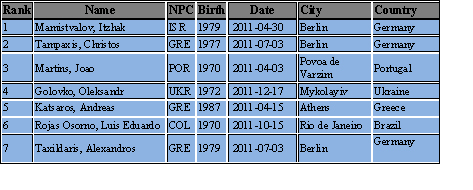
Men's 50 m Freestyle S2
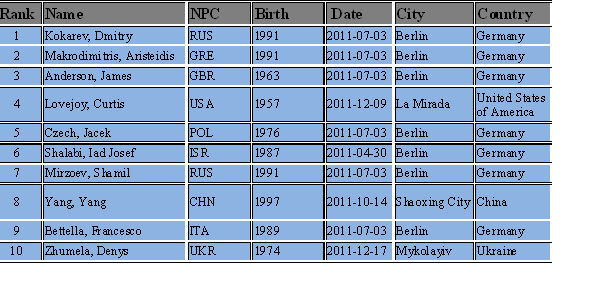
International Swimming Countries
Australia Canada China Czech Republic Egypt Germany India Ireland Israel Italy Kenya Korea, South Netherlands New Zealand Philippines Russia Singapore South Africa Spain Thailand United Kingdom United StatesTop
Best Swimmers of All Time
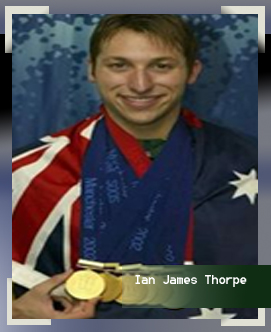 |
 |
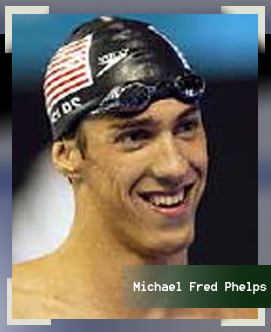 |
|||
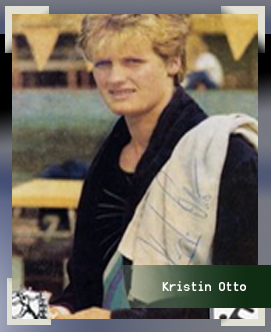 |
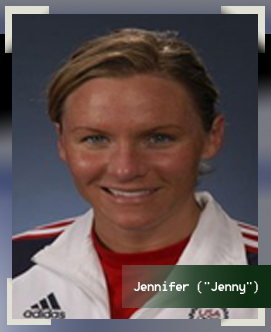 |
Top